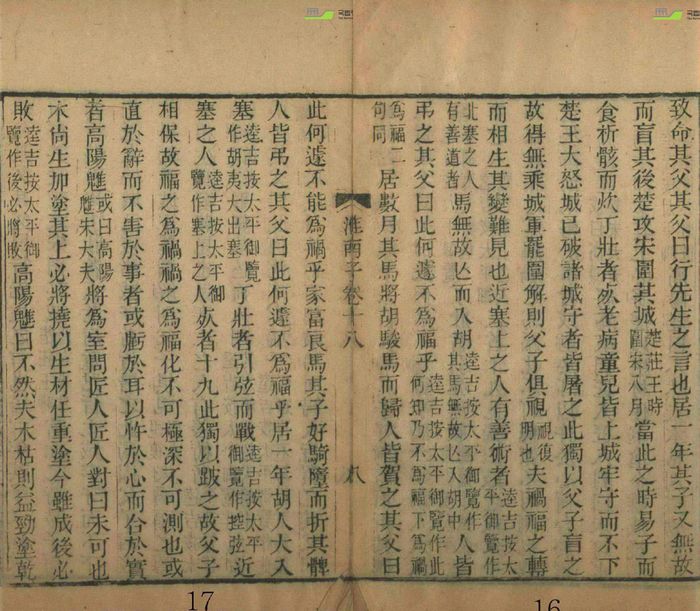"(Translation) 2019 塞翁失馬"의 두 판 사이의 차이
(새 문서: {{Primary Source Document3 |Image = |English = |Chinese = |Korean = |Genre = |Type = |Author = |Year = |Key Concepts= |Translator = 2019 JSG Summer Hanmun Workshop (Interme...) |
(→Translation) |
||
| (사용자 2명의 중간 판 2개는 보이지 않습니다) | |||
| 1번째 줄: | 1번째 줄: | ||
{{Primary Source Document3 | {{Primary Source Document3 | ||
| − | |Image = | + | |Image = 새옹실마.jpg |
|English = | |English = | ||
|Chinese = | |Chinese = | ||
| 21번째 줄: | 21번째 줄: | ||
{{둥근 모서리2 | {{둥근 모서리2 | ||
| = | | = | ||
| − | + | 近塞上之人有善術者,馬無故亡而入胡。人皆吊之。其父曰:「此何遽不為福乎?」居數月,其馬將胡駿馬而歸。人皆賀之。其父曰:「此何遽不能為禍乎?」家富良馬,其子好騎,墮而折其髀。人皆吊之。其父曰:「此何遽不為福乎?」居一年,胡人大入塞,丁壯者引弦而戰,近塞之人,死者十九,此獨以跛之故,父子相保。故福之為禍,禍之為福,化不可極,深不可測也。 | |
}} | }} | ||
| 28번째 줄: | 28번째 줄: | ||
| − | ==='''Student Translation : | + | ==='''Student Translation : Russell Guilbault'''=== |
| − | + | There was a man living near the border who was skilled at alchemy. One day his horse, for no reason, ran off into the barbarian lands; everyone commiserated with him. His father said: "Could this not unexpectedly turn out to be a blessing?" Several months later, his horse took a fine steed from the barbarians and returned; everyone congratulated him. His father said: "Could this not unexpectedly turn out to be a disaster?" Their family had an abundance of good horses, and the son was fond of riding, [but] he fell and broke his thigh. One year later, a horde of barbarians amassed at the border; able-bodied men drew their bows and did battle, and among the people at the border, nine out of ten were killed. Only on account of [the son's] lameness were the father and son able to save each other. Thus can blessings become disasters, and disasters blessings, changing without limit, deep beyond measure. | |
---- | ---- | ||
| − | *Discussion Questions: | + | *Discussion Questions:<br /> |
| + | (YO) Good. I was think about how to render 善術. The 術 is perhaps most reasonably translated "arts" in the sense of techniques and methods of various nature. (cf. ''fashu/pŏpsul'' 法術 'magic,' ''fangshu/pangsul'' 方術 'methods and arts,' ''yaoshu/yosul'' 妖術 or ''xieshu/sasul'' 邪術 'perverse | ||
| + | arts,' etc.) | ||
| + | |||
| − | |||
2019년 7월 17일 (수) 22:15 기준 최신판
| Primary Source | ||
|---|---|---|
 |
Title | |
| English | ||
| Chinese | ||
| Korean(RR) | ||
| Text Details | ||
| Genre | ||
| Type | ||
| Author(s) | ||
| Year | ||
| Source | ||
| Key Concepts | ||
| Translation Info | ||
| Translator(s) | Participants of 2019 JSG Summer Hanmun Workshop (Intermediate Training Group) | |
| Editor(s) | ||
| Year | 2019 | |
Original Script
Translation
Student Translation : Russell Guilbault
There was a man living near the border who was skilled at alchemy. One day his horse, for no reason, ran off into the barbarian lands; everyone commiserated with him. His father said: "Could this not unexpectedly turn out to be a blessing?" Several months later, his horse took a fine steed from the barbarians and returned; everyone congratulated him. His father said: "Could this not unexpectedly turn out to be a disaster?" Their family had an abundance of good horses, and the son was fond of riding, [but] he fell and broke his thigh. One year later, a horde of barbarians amassed at the border; able-bodied men drew their bows and did battle, and among the people at the border, nine out of ten were killed. Only on account of [the son's] lameness were the father and son able to save each other. Thus can blessings become disasters, and disasters blessings, changing without limit, deep beyond measure.
- Discussion Questions:
(YO) Good. I was think about how to render 善術. The 術 is perhaps most reasonably translated "arts" in the sense of techniques and methods of various nature. (cf. fashu/pŏpsul 法術 'magic,' fangshu/pangsul 方術 'methods and arts,' yaoshu/yosul 妖術 or xieshu/sasul 邪術 'perverse arts,' etc.)